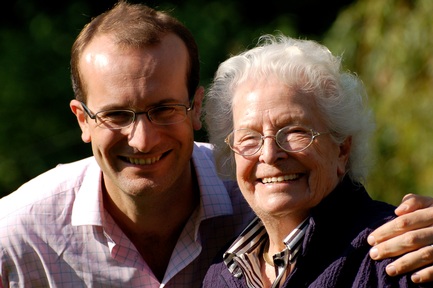Profile: Cognitive neuroscientist Dr Lynda Shaw wants to see women relish the challenges of ageing
“Women are quite extraordinary as they get older,” according to qualified psychologist and cognitive neuroscientist Dr Lynda Shaw.
Registered with the British Psychological Society and a Fellow of the Royal Society of Medicine, Dr Shaw has been involved in a great depth of ageing-related research, has lectured in psychology and neuroscience, and has published several books and academic papers, as well as advising a portfolio of business clients on making the most of a maturing workforce.

Focusing on the promotion of positive thinking on ageing issues, Dr Shaw believes that society often overlooks how people improve with age and encourages women to make the most of their later life skills, saying: “The world is beckoning for mature women who have improved with age to embrace and enjoy the wonderful resources and experiences they have.”
Dr Shaw highlights the intuitive people skills that older women have, as well as their ability to communicate clearly and to manage relationships effectively.
Commenting on the benefits of old age, Dr Shaw explains: “Both genders can relish that experience brings confidence and we learn to enjoy the here and now more as we age. We have realistic expectations and have probably invested heavily in great relationships with friends and family. Most of us care about our appearance, but have also learnt to place importance on other things.
“That said, women are quite extraordinary as they get older. As our oestrogen supply runs down around the time of the menopause and we have been around the block a few times and picked up a few bruises along the way, women are more able to observe, read a situation, evaluate and communicate.
“Women are more likely to have strong relationships and, as children grow up, the female needs to find other investments to satisfy her needs. This is when her attention moves further outside the home and at this stage women are stronger than ever, and can contribute enormously to the economy, community and society as a whole.”
According to Dr Shaw, women are hard-wired to read certain situations with a greater clarity, for example: “It is quite typical for men to think women are almost spooky in the way they intuitively understand things. The female will ‘see’ problems that males are oblivious to. Take the scenario of a party. A woman will notice if a couple have fallen out, or if there is an attraction between two people who have spent the evening avoiding one another. Men rarely notice such things. There is nothing spooky going on, females are just wired differently to males and they get even better at it with age.”
Dr Shaw continues: “Both typical male and female brains have their own strengths, but we are products of our biological genetic code, chemical make-up including hormones, environment and social upbringing. Discussing typical gender characteristics must not inflict unnecessary limitations on any of us.”
Dr Shaw’s studies have also given her strong feelings on the subject of retirement; she insists that staying in work for longer produces far healthier effects and points to the lack of motivation and social isolation experienced by those leaving work as a cause of depression, stress and anxiety. She says: “Many retirees I have talked with have said they don’t know how to fill their day and feel older since quitting work.”
On ageing positively, Dr Shaw says: “You can actually age more healthily by staying in work as long as your work is fulfilling and not drudgery. We know staying sharp on the job can help you stay mentally fit and healthy. Those who retire earlier often become sedentary sooner and develop health issues.
“We all know that job loss for any age group can have a detrimental effect on physical, mental and emotional health. This not only includes the health of the individual, but also affects the well-being of their families and loved ones.
“We have this wonderful bank of talent in the older generation, why are we throwing it away in business? Let’s look at what is right with the ageing population and be grateful that we have longevity, rather than look at what is wrong.”
Dr Shaw has also been motivated by the rise of dementia, having set up an advisory service to advise loved ones how to cope with the physical, emotional and financial strains caused by conditions like Alzheimer’s, vascular dementia, dementia with Lewy bodies and fronto-temporal dementia.
On the treatment of dementia, Dr Shaw supports efforts to keep people in their own homes rather than favouring a move into residential care, saying: “Most people want to be in their own homes for as long as possible. If the individual has difficulties looking after themselves, this alone is not a reason to be relocated. We need to see more affordable, caring and consistent home care that is readily available. This will address economic, psychological and general welfare issues.”
What was your first job? Trainee secretary
What is your favourite book? The Lord of the Rings by JRR Tolkien
What is your favourite film? It’s A Wonderful Life with James Stewart
What is your favourite piece of music? I Love To Boogie – Mark Bolan
What is the best present you have received? More recently that would be an authentic NASA astronaut flight suit because I’m saving up to go into outer space, but only when the general public can go far enough to be able to look back and see the entire earth.
What was your last holiday? Munich – Christmas Markets
Latest Profiles News
 01-Aug-19
Deal or No deal: Boris Johnson must protect care workforce says home care chief
01-Aug-19
Deal or No deal: Boris Johnson must protect care workforce says home care chief
 04-Dec-15
Former John Lewis director reveals why his home care company is employee owned
04-Dec-15
Former John Lewis director reveals why his home care company is employee owned
 17-Jul-15
Being a home care worker gives you the opportunity 'to make a real difference to someone’s life'
17-Jul-15
Being a home care worker gives you the opportunity 'to make a real difference to someone’s life'
 04-Mar-15
Home Instead boss calls for 'radical change' saying social care and health must be integrated
04-Mar-15
Home Instead boss calls for 'radical change' saying social care and health must be integrated
 02-Dec-14
Profile: ‘We do not do 15-minute visits’ says managing director of Right at Home
02-Dec-14
Profile: ‘We do not do 15-minute visits’ says managing director of Right at Home